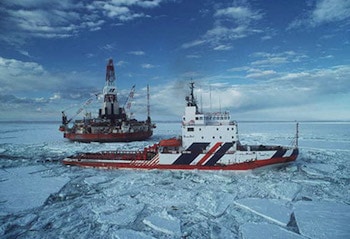Sea ice in the Arctic Circle is currently melting at a pace far greater than scientists had originally projected. While this is bad news for the planet — sea ice helps reflect the sun’s rays and keeps the arctic cooler — it has created new paths for the oil industry to exploit the resources hidden deep under the icy water.
Drilling activities in the Arctic have currently stalled, but this stall isn’t going to last forever. The Arctic is estimated to hold about 13% of the world’s oil reserves, and at least one-third of the total oil within U.S. territory. This means that the oil companies don’t need to worry with drilling on foreign lands or about the prospect of not hitting a massive payday. They will return.
That’s the problem – they will return. According to a new report by the National Research Council, that is a very scary scenario for both the climate and the environment. The report says that increased drilling and the placement of oil pipelines make oil spills a question of “when,” not “if.”
The report lays out two very specific themes with regards to Arctic drilling. The first is that there is no discernable oil spill response plan, and the second is that the history of oil companies tells us with great certainty that there will be a massive spill as a result of the increased activity in the region.
The anatomy of an Arctic oil spill is far more complicated than that of a typical offshore oil spill. The ice cover makes it difficult, sometimes impossible, for cleanup vessels to make their way into the area. Also to be taken into consideration is the lack of infrastructure in the Arctic. There are few roads and other transportation avenues to reach the region, which means that the response time would be exponentially longer than that of a typical offshore spill. The report also says that not enough is known about the marine environment of the Arctic to fully understand how a spill could impact the region.
While access is a major problem, the report also tells us that the U.S. Coast Guard’s minimal presence in the area and their lack of resources make cleanup, detection, and containment a serious problem. Because their presence is so limited in the area, they would have to rely on either foreign reporting or company self-reporting in the event of a disaster in the area.
One of the more controversial suggestions offered by the report is the assertion that we need to have a trial run in the Arctic, which would mean intentionally spilling oil to figure out the most effective way to combat a spill. For obvious reasons, obtaining a permit to intentionally release oil into the environment is nearly impossible.
The information provided in the report is not without precedent. On December 31st, 2012, Shell Oil lost control of its Kulluk oil rig, causing the floating rig to drift ashore. As Sierra Club executive director Michael Brune pointed out at the time:
In just one year, Shell has proven over and over again that they are completely incapable of safely drilling in the Arctic. Their ships have caught fire and lost control, they’ve damaged their own spill containment equipment, and they’ve been caught entirely unprepared for the challenges of the Arctic…This is the last straw. We should judge Shell not by their assurances or their PR tactics, but by their record – and Shell’s record clearly demonstrates that letting them operate in the Arctic is an invitation for disaster.
The report also makes note of the poor responses and lingering environmental damage caused by BP’s Deepwater Horizon oil spill and the Exxon Valdez oil spill. Even after 25 years, areas affected by the Exxon Valdez have been slow to recover, and a similar spill further north in the Arctic would be an even larger environmental problem for the aforementioned reasons.
The NRC report serves as a huge wakeup call to the public that the oil industry is not responsible enough to be trusted in the Arctic. Their past actions have shown that they are not ready, and allowing them to exploit an area that is only opening up as a result of our continued reliance on fossil fuels would be a grave mistake.
Subscribe to our newsletter
Stay up to date with DeSmog news and alerts







